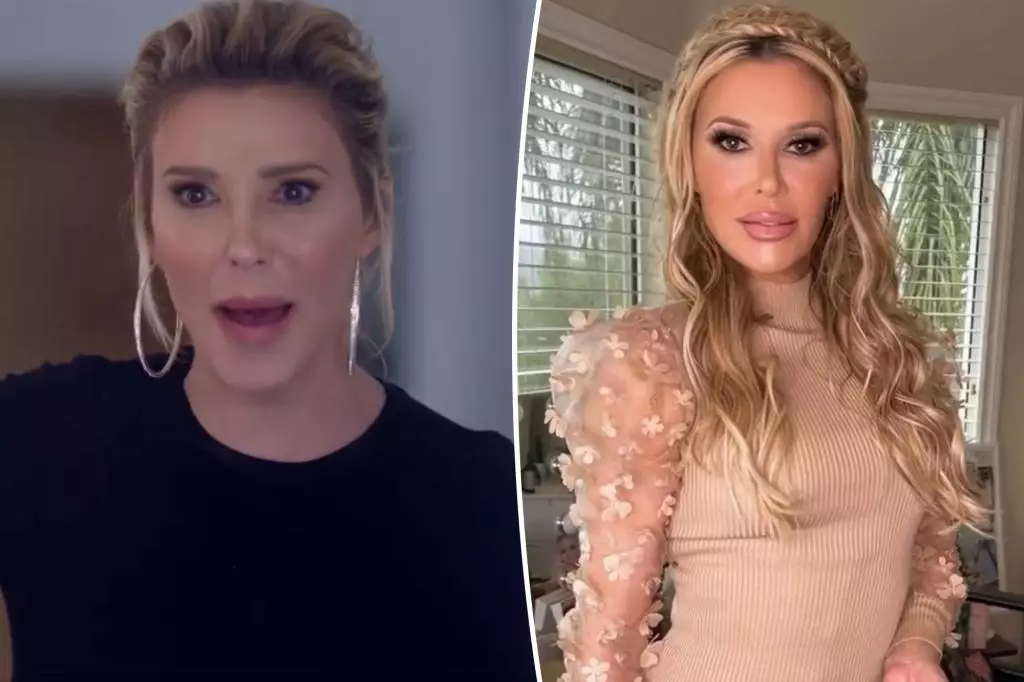Reality television has long been a platform for drama, but the latest developments surrounding Brandi Glanville and Andy Cohen have brought the concerns of misconduct and legal battles to the forefront. As a former cast member of “The Real Housewives of Beverly Hills,” Glanville continues to make headlines, but this time, the spotlight is directed at serious allegations of sexual harassment, a fractious legal situation, and the consequences of life in the public eye.
In an astonishing turn of events, Brandi Glanville recently lamented the alleged severance of ties with her legal team, stating that they abruptly declared her case against Bravo to be baseless. She took to social media to express her frustrations, insinuating possible misconduct on the part of her lawyers, who had previously assured her of a strong legal stance against the network. Glanville’s rhetorical question, “paid off maybe?” suggests that she believes her legal representatives may have been swayed by external influences. This allegation opens a floodgate of questions about ethical practices within the legal community, particularly in high-profile cases within entertainment.
Glanville’s situation illustrates the unpredictability of legal battles in the realm of celebrity culture, where image, influence, and money often intertwine. The perceived abandonment by her lawyers only adds a layer of complexity to her claims against a powerful figure in the industry, highlighting the power imbalances that exist within Hollywood.
The core of Glanville’s grievances revolves around a video allegedly sent by Andy Cohen, in which he purportedly made inappropriate sexual remarks about her. According to a letter from Glanville’s former legal team to the higher-ups at NBC and Bravo, Cohen allegedly stated that he wanted to “sleep with another Bravo star” while thinking about her. This shocking claim positions Cohen not just as a colleague but as a figure of authority who allegedly misused his power to engage in unsolicited sexual dialogue.
The letter’s implications that Cohen was intoxicated during the incident adds another dimension to the narrative. It questions the boundaries of consent and professionalism within work relationships, especially in environments often characterized by blurred lines like reality television. Glanville’s allegations echo broader discussions about harassment in the workplace, reminiscent of high-profile cases in various industries where those with power have exploited their positions.
Cohen, for his part, has publicly downplayed the incident, describing it as an inappropriate joke meant to be humorous. His swift defense attempts to mitigate the fallout, framing the interactions as consensual banter rather than harassment. This reaction raises questions about the nature of humor in professional settings and whether the intent can ever justify the impact of such words, especially regarding consent and power dynamics.
Moreover, the ongoing discourse surrounding Glanville’s actions and Cohen’s responses has sparked debate about accountability in the entertainment industry. Many believe that public figures should be held to higher standards, particularly when their actions can perpetuate environments of fear and discomfort among those they employ.
The entirety of this situation reveals the significant toll that the pressures of reality television can take on individuals. Glanville has been candid about her struggles with mental health since leaving the “Real Housewives” franchise, indicating that the stress of her experiences has manifested in physical ways, notably in her claims about facial swelling. Her journey illustrates how the expectations and challenges of fame can lead to severe personal struggles, which are often overlooked in the glitzy world of reality TV.
As Glanville continues to navigate her legal and personal challenges, her situation serves as a cautionary tale about the darker undercurrents of fame. The entertainment industry often prioritizes profit over personal welfare, leading to toxic environments where abuse may thrive unchecked.
As both sides prepare for an inevitable legal confrontation, fans and commentators are left to reflect on the implications of these allegations. The importance of creating safe spaces within the entertainment sphere cannot be overstated. For Glanville, the road ahead is fraught with obstacles, but her story underscores the urgency for change in an industry too often shrouded by glamour and disassociated from accountability. The outcome of this case could have lasting ramifications, not just for Glanville and Cohen but for others who work in a landscape that often revolves around exploitation masquerading as entertainment.

